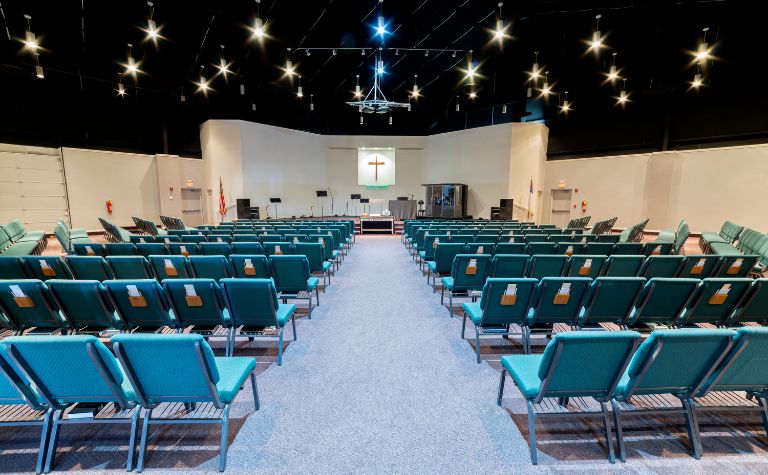Recent studies show that church membership is declining. Some suggest it is part of a social trend of people being less committed in all areas of life. Nevertheless, many denominations, churches, and pastors encourage church membership for important reasons.
In Assemblies of God churches, people may become members if they (1) profess faith in Jesus Christ, (2) adhere to the constitution and bylaws of the church, and (3) agree with the Assemblies of God doctrinal statement. Speaking in tongues isn’t necessary to become a member of an Assemblies of God church.
Why should a person consider being a member of an Assemblies of God church? Why does a person have to adhere to the constitution and bylaws of the church? What beliefs are described in the Assemblies of God doctrinal statement? Keep reading to learn more.
Also, see Why Do People Leave the Assemblies of God? to learn more.

Why Should Someone Consider Church Membership?
There are many good reasons to formally join a church. Yet it’s important to note that most denominations, churches, and pastors welcome and are happy to serve those who decide against formal membership. (Also see Assemblies of God vs. Pentecostal: What’s the Difference?)
Membership is more important in certain traditions. Generally, Assemblies of God churches don’t put pressure on people to formally join, but they make membership available to those who are interested.
Formal membership in Assemblies of God churches is important for several reasons:
- Membership demonstrates support for the leadership and vision of the church: Assemblies of God, pastors, and elders must work according to the church constitution and bylaws, and memberships are a formal and public expression of commitment to help them do that.
- Membership demonstrates unity with other believers: membership is a public way of expressing unity of belief and practice with other Christians. Church membership is partially analogous to baptism in that it’s a public expression of a commitment, though it’s not necessary for salvation. People can be united with others in belief and practice without membership, but formally joining the church signifies a full expression of unity.
- Membership avails people of the full exercise of their spiritual gifts: some positions of service in Assemblies of God churches are only available to members, such as an elder. It’s important to the ministerial staff, and the elderboard that people express complete public support and agreement for the Assemblies of God’s doctrinal statement and the constitution and bylaws before serving in decision-making roles related to the vision of the church.
- Membership gives people a vote in Assemblies of God churches: the congregation, specifically the voting membership, makes important decisions in Assemblies of God churches. Ministerial staff and elders make many decisions, but the most significant ones regarding budget, facilities, and some staff positions are the result of congregational votes.
Before a person has a voice in church matters, through the exercise of voting, the pastor, elderboard, and other members need to know that they share the same beliefs and agree to serve according to the church’s policies and procedures, as stated in the constitution and bylaws.
Why is membership in congregational churches so important? It must be clear that voters share the beliefs and values of a church before they are granted a say in important decisions.
Membership requirements are different in churches in which the congregation doesn’t vote on important matters. In non-congregational church governments, less vetting occurs because most members don’t have a vote or a voice in important decisions. (Also see Assemblies of God vs. Methodist: What’s the Difference?)

How Does a Person Become a Member of an AG church?
There is complete agreement among Assemblies of God churches on the denomination’s doctrinal statement, called The 16 Fundamental Truths, and membership requirements.
However, because churches are independent, many have customized the membership process. Though processes can vary from church to church, these steps are often included in becoming members of an Assemblies of God church:
- Talking with a pastor or elder: a person who desires to become a member should make it known to a pastor or elder because church leaders often oversee the membership process. A person should ask about the steps they need to take to become a member and when the next opportunity is to do so.
- Attend the membership meeting or class: many churches offer a membership meeting or class. During that gathering, a pastor or elder often discusses the history of the church, explains what the Assemblies of God denomination believes in, and informs people of the benefits and process of becoming a member. Some people may take the class or attend the meeting and decide against membership, which is their choice.
- Filling out paperwork: some churches ask new members to sign a membership application that acknowledges their agreement with The 16 Fundamentals of Truth and the church constitution and bylaws. Some pastors and elderboards review membership applications before they are presented to the congregation.
- A congregational vote: some congregations vote on new members based on the recommendation of the pastor or elderboard. This is often simply a gesture of unity and inclusion into the church body. The congregation isn’t responsible for vetting would-be members or analyzing their competency in relation to membership requirements.

What Beliefs Are In the Assemblies of God Doctrinal Statement?
The 16 Fundamental Truths are “non-negotiable tenets” of Assemblies of God churches. Some are primary doctrines of the Christian faith, like the Trinity and the Second Coming of Christ. (Also see Assemblies of God vs. Church of God: What’s the Difference?)
Other beliefs are secondary matters of the faith but are important to the Assemblies of God tradition, like speaking in tongues as the evidence of baptism in the Holy Spirit.
- The Scriptures Inspired
- The One True God
- The Deity of the Lord Jesus Christ
- The Fall of Man
- The Salvation of Man
- The Ordinances of the Church
- The Baptism in the Holy Spirit
- The Initial Physical Evidence of the Baptism in the Holy Spirit
- Sanctification
- The Church and Its Mission
- The Ministry
- Divine Healing
- The Blessed Hope
- The Millennial Reign of Christ
- The Final Judgment
- The New Heavens and the New Earth
The denomination notes: “The phraseology employed in this Statement is not inspired nor contended for, but the truth set forth is held to be essential to a full-gospel ministry. No claim is made that it covers all Biblical truth, only that it covers our need as to these fundamental doctrines.”
Also see Assemblies of God vs. Foursquare: What’s the Difference?
Please see the related articles below.
References:
[1] Source
[2] Source
[3] Source
Related Questions
The Assemblies of God and Baptist traditions are sizable and significant branches of Protestant Christianity. They each have a fascinating history in Europe, America, and as of the twenty-first...
The Assemblies of God and the Church of God (Cleveland, Tennessee) are two of the oldest Pentecostal denominations in the world. There is a lot that unites these Protestant-Christian traditions, yet...
